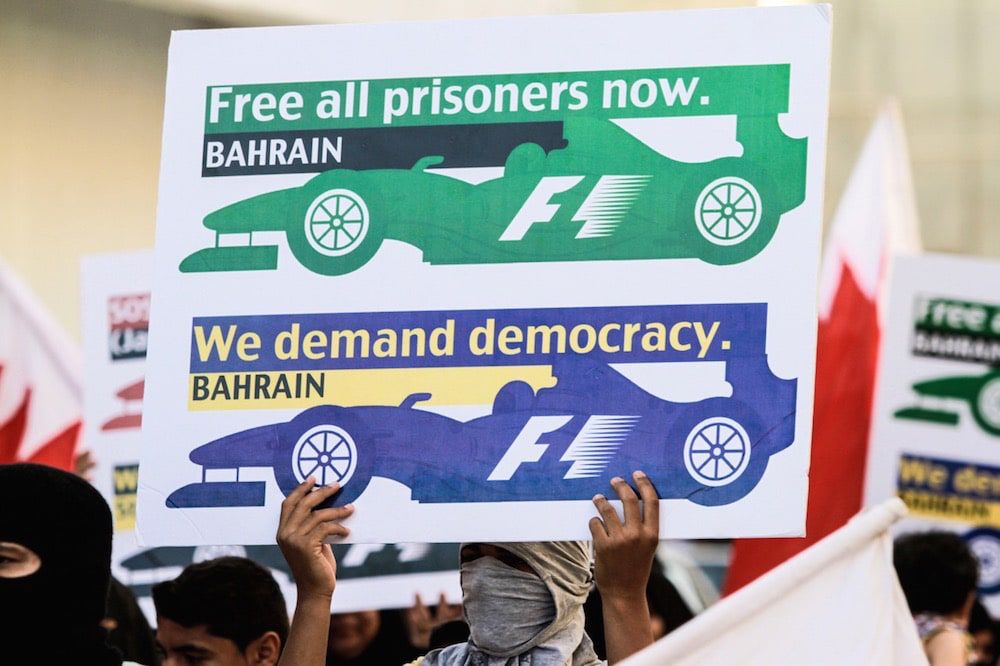London / Beirut
19 March 2022
Bahrain: Will the 2022 F1 season be a ‘New Era’ of human rights abuses in Bahrain and across the Gulf?
“Our 2022 race is a landmark moment for the sport. Fittingly being held under our slogan ‘A New Era’, the race will usher in the next chapter of F1 following perhaps the biggest revolution of rules in the history of the sport.”
Sheikh Salman bin Isa Al Khalifa, Chief Executive of Bahrain International Circuit, quoted in 17 January 2022 report
As tens of sporting organisations have withdrawn from Russia along with participation by Russian sportspersons over the government’s illegal, armed intervention into Ukraine; amidst dismay and consternation over China’s treatment of its Uyghur minority and the resultant ‘diplomatic boycott’ of the Beijing Olympics in early 2022, one might have thought that global sporting brands like F1 – Formula 1 motor racing – with its vaunted ‘human rights statement’ – might have listened to the appeals made by campaigners.
Like the Bahrain Institute for Rights and Democracy (BIRD)and the “90 lawmakers [who] slam F1 & FIA for ‘actively facilitating sportswashing’ of Gulf human rights abuses” In its 2022 letter, BIRD:
“has urged teams, the Grand Prix Drivers Association (GPDA), the FIA and F1 CEO Stefano Domenicali to not overlook the atrocities. The address suggested Formula 1 has ‘abandoned those who have been tortured and imprisoned’ partly as a result of their criticism of the race being held in the country.”
In 2020 Salam for Democracy and Human Rights called on F1 to Suspend holding the Formula 1 motor race in Bahrain until the government acts on long standing human rights violations . This appeal did not attract a response, despite seven direct attempts from us to reach the company.
We renew our call today: Suspend holding the Formula 1 motor race in Bahrain until the government acts on long standing human rights violations
Specifically:
- The government’s Ombudsman, National Institution for Human Rights and Special Investigative Unit must create an arms-length, independent body, with the force of law, to determine whether and how the Government of Bahrain (GoB) should compensate Najah Yusuf and should provide recompense in connection with her 2017 protest at the holding of the Grand Prix in Bahrain.
But also:
- Release all prisoners of conscience and political prisoners, including opposition leaders, unfairly tried and convicted, where there is no prospect for fair retrial, such as Abdulhadi al-Khawaja, and rescind unfair convictions on those, such as Nabeel Rajab, now out of prison under Alternative Punishment provisions;
- End torture and ill treatment in Bahrain, including withholding medical care, such as in relation to Hassan Mushaima and/or Dr Abduljalil al-Singace or those in need of care in relation to COVID-19;
- End restrictions on freedom of expression and association by rescinding bans on political groups such as of Al-Wefaq and Wa’ad, and by amending the Penal and Press Code to bring them in line with international standards;
- Provide independence to Bahrain’s Lawyers’ Association and facilitate it joining the International Bar Association; and
- Provide redress to those who have faced arbitrary arrest, ill treatment and arbitrary deprivation of their citizenship.
These, amongst other measures, must be taken in order to show that the Government of Bahrain respects human rights and, above all, inherent human dignity, notably of those who have suffered.
Background
The first race of the 2022 season of the Formula 1 race will take place in Bahrain on 20 March 2022. A massive sporting event, an average of 70 million people watched each race in 2021. The opening race is an even grander event however, having received 84 million viewers in 2021. The eyes of global motorsport, and indeed the world, will be on Bahrain this year.
The glossy websites and brochure omits that the GoB long history of torture and that officials reportedly used Manama’s F1 track reportedly having been used as a makeshift “interrogation centre” during mass protests in 2011.
While millions of viewers may share temporary moments of jubilation on the racetrack, Bahrain’s Shi’a majority and thousands of migrant workers are prevented from exercising their freedoms or availing themselves of the protection promised them, every day.
The holding of international sports events such as the F1 enables countries like Bahrain to distract the world from consistently a poor human rights record and major democratic deficits.
Controversy over the Beijing 2022 Winter Olympics, arising from the government’s actions amidst the Uyghur people; and the mass withdrawal of organised sports from Russia as a result of that government’s invasion of Ukraine has appeared to presage wider reconsideration of sports’ role in the wider society.
Such goals shouldn’t be limited to Bahrain and F1, but to other countries with poor human rights records and all international sports events such as the FIFA World Cup, the Olympics, and the Winter Olympics.
F1 itself claims it should have nothing to do with human rights abuses, yet four time world champion F1 driver Ashton Martin Sebastian Vettel chose not to participate in Russia this year. He is the first of a series of drivers, conscious objectors, who declared they are not prepared to race for the entertainment of authoritarians. This willingness by drivers to take action is not new. Lewis Hamilton chose to make a statement in the Qatar race last season, wearing a rainbow coloured helmet in protest against Qatar’s stance on LGBTQ+ issues.
As the F1 season gets underway, SALAM DHR will publish, in the coming days, a study on the breadth of sportswashing led by members of Bahrain’s ruling family.


 العربية
العربية Français
Français Deutsch
Deutsch